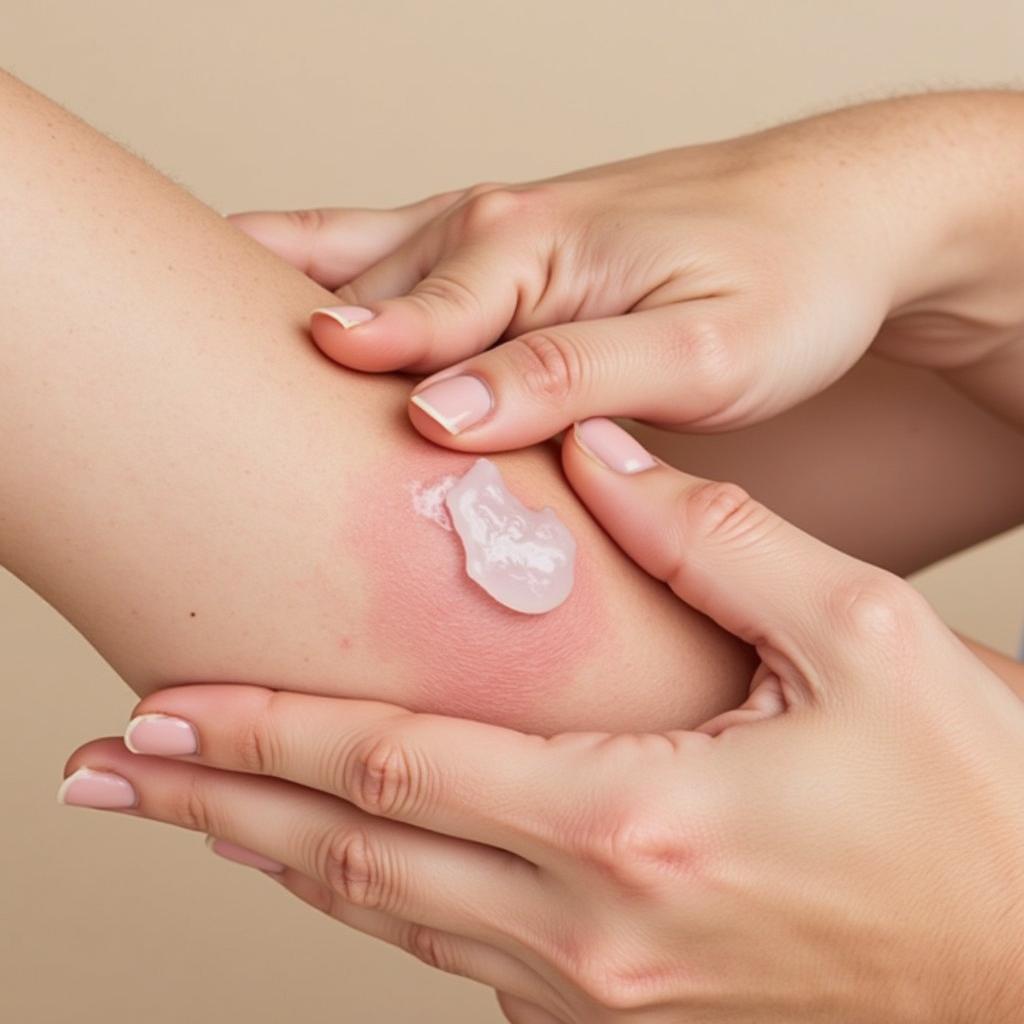ASEA RENU 28 is a popular skincare product that is often touted for its potential benefits for eczema. But does it live up to the hype? This article will delve into the science (or lack thereof) behind ASEA RENU 28, explore its potential benefits and drawbacks for eczema, and help you make an informed decision about whether it’s the right choice for you.
Understanding Eczema: More than Just Dry Skin
Eczema, also known as atopic dermatitis, is a chronic skin condition that causes dry, itchy, and inflamed skin. It’s a complex condition with a variety of triggers, including genetics, environmental factors, and immune system dysregulation. While there’s no cure for eczema, many treatments can manage symptoms and provide relief.
 Woman scratching itchy skin, common symptom of eczema
Woman scratching itchy skin, common symptom of eczema
What is ASEA RENU 28?
ASEA RENU 28 is a topical gel marketed as a skincare product designed to promote skin cell turnover and improve the appearance of aging skin. Its key ingredients include water, sodium magnesium fluorosilicate, and a proprietary blend of redox signaling molecules. While the company claims these molecules can revitalize skin cells, there is limited scientific evidence to support these claims, especially when it comes to treating eczema.
Potential Benefits of ASEA RENU 28 for Eczema
Some users of ASEA RENU 28 have reported improvements in their eczema symptoms, including reduced itching, redness, and dryness. These anecdotal reports suggest that the gel’s moisturizing properties and potential anti-inflammatory effects might provide temporary relief for some individuals.
 Applying ASEA RENU 28 gel on eczema-affected skin
Applying ASEA RENU 28 gel on eczema-affected skin
However, it’s crucial to emphasize that:
- Anecdotal evidence is not scientific proof. What works for one person might not work for another, especially with a complex condition like eczema.
- The placebo effect can play a role. When people believe a product will help, they may perceive improvements even if the product itself has no real effect.
Potential Drawbacks and Considerations
- Lack of Scientific Evidence: The scientific evidence supporting the effectiveness of Asea Renu 28 For Eczema is limited. Most of the information available comes from the company itself or anecdotal testimonials.
- Cost: ASEA RENU 28 is a relatively expensive skincare product, and its use for eczema is not typically covered by insurance.
- Potential for Irritation: While ASEA RENU 28 is generally considered safe for topical use, some individuals may experience skin irritation, redness, or burning sensations. It’s always wise to perform a patch test on a small area of skin before applying it to larger areas.
The Bottom Line: Proceed with Caution
While some individuals might find temporary relief from eczema symptoms using ASEA RENU 28, it’s essential to approach this product with a healthy dose of skepticism. The lack of scientific evidence and the potential for high cost with minimal results are important considerations.
 Discussing ASEA RENU 28 for eczema with a dermatologist
Discussing ASEA RENU 28 for eczema with a dermatologist
FAQs about ASEA RENU 28 for Eczema
- Is ASEA RENU 28 FDA approved for eczema? No, ASEA RENU 28 is not FDA approved for the treatment of eczema or any other medical condition. It is marketed as a cosmetic product.
- Can I use ASEA RENU 28 with my current eczema medications? It’s crucial to consult with your doctor or dermatologist before using ASEA RENU 28 alongside any prescribed eczema medications, as it’s unknown if there could be any interactions.
- How long does it take for ASEA RENU 28 to work on eczema? There’s no definitive answer to this question. Anecdotal reports vary greatly, and some people might not experience any improvement.
If you’re considering using ASEA RENU 28 for eczema, consult with a healthcare professional to ensure it’s appropriate for your individual needs.
Need more information or support on navigating eczema and skincare? Contact us at Phone Number: 0369020373, Email: aseanmediadirectory@gmail.com, or visit us at our office located at Thon Ngoc Lien, Hiep Hoa, Bac Giang, Vietnam. Our dedicated customer support team is available 24/7 to assist you.
